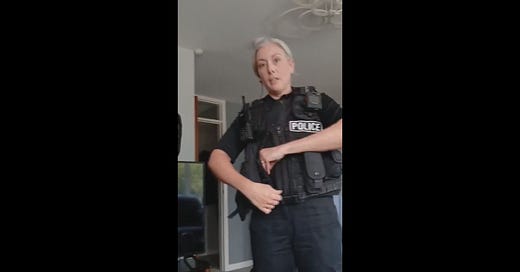In recent years, the United Kingdom has increasingly drawn attention for arresting individuals based on social media activity, particularly Facebook posts deemed offensive or obscene. Under laws like the Communications Act 2003 (Section 127), individuals can face criminal charges for using the electronic communications network to post content that is “grossly offensive, indecent, obscene, or menacing.” While authorities argue that these laws aim to maintain social harmony, critics question whether such actions infringe on fundamental rights like freedom of speech.
The Incident: Arrest Over Facebook Comments
A recent video transcript highlights one such case. In the footage, a man is arrested late at night by officers citing Section 127 of the Communications Act 2003. The officers explain the arrest is due to complaints about comments the individual allegedly posted on Facebook. Despite the man’s confusion, the arresting officer maintains that the individual must be taken to the station for questioning.
Key exchanges from the video include:
The Arrest Process:
The officer formally arrests the individual, stating, “I’m arresting you on suspicion of improper use of the electronic communications network.”
The man expresses disbelief, asking, “So I’m actually being arrested for posting on Facebook?”
The officer confirms that the arrest is due to “offensive, obscene” comments that prompted complaints.
Unclear Allegations:
When asked about the specific comments leading to the arrest, the officer defers, saying the details will be addressed in an interview.
This lack of immediate clarity raises questions about transparency and procedural fairness in such cases.
Detention Concerns:
The man mentions medications for pain, anxiety, and sleep, highlighting concerns about the potential impact of arrests on individuals with health issues.
Legal Framework and Criticism
Section 127 of the Communications Act 2003 criminalizes using public electronic communications networks to post content that could be deemed offensive or threatening. While initially intended to address harassment and explicit threats, the law’s broad wording allows for the prosecution of a wide range of online speech.
Critics argue that this legal framework is outdated and incompatible with modern digital communication platforms, where content often reaches unintended audiences and interpretations can vary widely. Civil liberties advocates contend that:
Subjectivity: Terms like "offensive" and "obscene" are inherently subjective, making enforcement inconsistent and prone to misuse.
Chilling Effect: Arrests for online speech may deter individuals from expressing opinions, even if their comments fall within acceptable free speech boundaries.
Human Rights Concerns: The right to freedom of expression, enshrined in international agreements like the European Convention on Human Rights (ECHR), could be at risk. Article 10 of the ECHR guarantees the right to hold opinions and share information without interference, subject to certain restrictions deemed necessary in a democratic society.
Public Reaction and Implications
Cases like this have sparked public debate about the balance between protecting individuals from harm and upholding free speech rights. Many view these arrests as disproportionate responses, particularly when the comments in question are not explicitly violent or threatening.
Potential Consequences:
Social Trust: Frequent arrests for online activity could erode trust between the public and law enforcement.
Judicial Overreach: Legal systems might become overburdened with cases stemming from social media complaints, detracting from focus on more serious crimes.
Global Perception: The UK’s approach could be seen as regressive, contrasting with other democracies that prioritize free expression in online spaces.
A Call for Reform?
The growing number of arrests over social media activity in the UK underscores the need for a nuanced approach. While combating harmful speech is a legitimate goal, current laws risk overreach. Advocates suggest reforms that:
Clarify Legal Definitions: Updating laws to provide precise definitions of terms like “offensive” and “obscene” could prevent subjective interpretations.
Promote Alternative Measures: Encouraging dialogue, education, and content moderation may address online grievances without resorting to arrests.
Protect Fundamental Rights: Aligning laws with modern interpretations of free speech ensures compliance with human rights standards.
Conclusion
The UK’s continued arrests over Facebook posts reflect the challenges of regulating speech in the digital age. While maintaining respect and civility online is important, overly punitive measures may infringe on fundamental freedoms. As cases like the one described become more common, they serve as a stark reminder of the delicate balance between safeguarding public order and protecting individual rights. Whether these arrests constitute human rights violations will likely depend on how authorities evolve their approach in the years ahead.






Opinion became a crime so states are now able to censor anyone, from individuals to entire platforms. And that's part of the so called "democracy".
Violence needs to be put back into the hands of the people, breaking the State's monopoly.